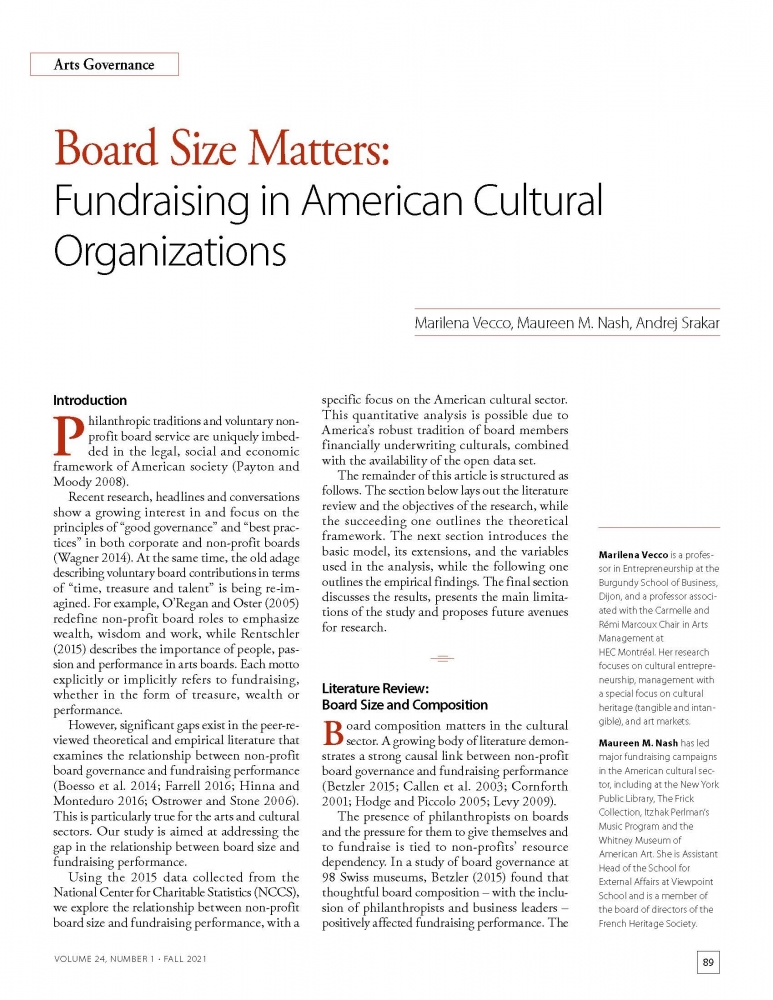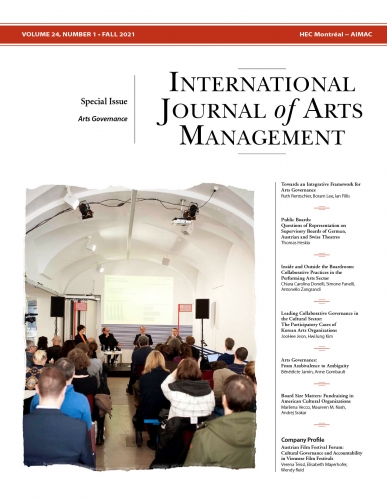Board Size Matters: Fundraising in American Cultural Organizations
Product: Article
$21.00 CA
Marilena Vecco is a professor in Entrepreneurship at the Burgundy School of Business, Dijon, and a professor associated with the Carmelle and Rémi Marcoux Chair in Arts Management at HEC Montréal. Her research focuses on cultural entrepreneurship, management with a special focus on cultural heritage (tangible and intangible), and art markets.
Maureen M. Nash has led major fundraising campaigns in the American cultural sector, including at the New York Public Library, The Frick Collection, Itzhak Perlman’s Music Program and the Whitney Museum of American Art. She is Assistant Head of the School for External Affairs at Viewpoint School and is a member of the board of directors of the French Heritage Society.
Andrej Srakar is a scientific associate at the Institute for Economic Research and an assistant professor in the School of Economics and Business, University of Ljubljana, Slovenia. His research focuses on probability, mathematical statistics, econometrics and cultural economics. He is a member of the program committee for the upcoming Association for Cultural Economics (ACEI) International Conference.
ABSTRACT
Board financial contributions and board fundraising efforts are fundamental to financial sustainability in the American cultural sector. This study investigates the relationship between board size and fundraising performance in relation to resource dependency theory. Although there are several studies that focus on board size and firm performance in the commercial sector, there is limited literature examining the link between board size and fundraising in the cultural sector. The authors use cubic spline interpolation and linear mixed regression methods based on data from the National Center for Charitable Statistics (NCCS) to estimate and explain a positive but non-linear relationship between total contributed revenue and board size in 2015. Moreover, they demonstrate how this relationship is conditioned by the cultural sector and the state. By deepening our understanding of how a cultural board’s size can affect annual fundraising efforts, this study illuminates an under-researched topic. The results have practical implications for the strategic management of board recruitment in arts and culture organizations.
KEYWORDS
Non-profit governance, board size, philanthropy, resource dependency, cultural sector, fundraising performance, fundraising, USA
RÉSUMÉ
Les contributions financières et les efforts de levée de fonds des conseils d’administration sont essentiels à la viabilité financière du secteur culturel américain. Cette étude explore la relation entre la taille d’un conseil d’administration et le rendement des collectes de fonds dans le cadre de la théorie de la dépendance aux ressources. Plusieurs études traitent de la corrélation entre la taille d’un conseil et son rendement dans le secteur commercial, mais la littérature examinant le lien entre la taille d’un conseil et la levée de fonds dans le secteur culturel est assez limitée. Les auteurs utilisent les méthodes d’interpolation par spline cubique et de régression linéaire mixte afin d’estimer et d’expliquer, en se fondant sur des données du National Center for Charitable Statistics (NCCS), une relation positive, mais non linéaire entre le total des revenus prives et la taille des conseils d’administration en 2015. De plus, ils montrent comment cette relation est influencée par le domaine culturel et la place de l’état. En approfondissant notre compréhension de la façon dont la taille d’un conseil d’administration d’un organisme culturel peut avoir une incidence sur les efforts des levées de fonds annuelles, cette étude met en lumière un sujet peu étudié. Les résultats ont des implications pratiques sur la gestion stratégique du recrutement des membres du conseil d’administration dans les organismes des arts et de la culture.
MOTS CLÉS
Gouvernance des organismes sans but lucratif, taille du conseil, philanthropie, dépendance aux ressources, secteur culturel, rendement des collectes de fonds, collecte de fonds, Etats-Unis

